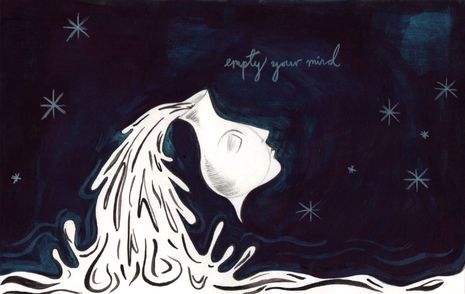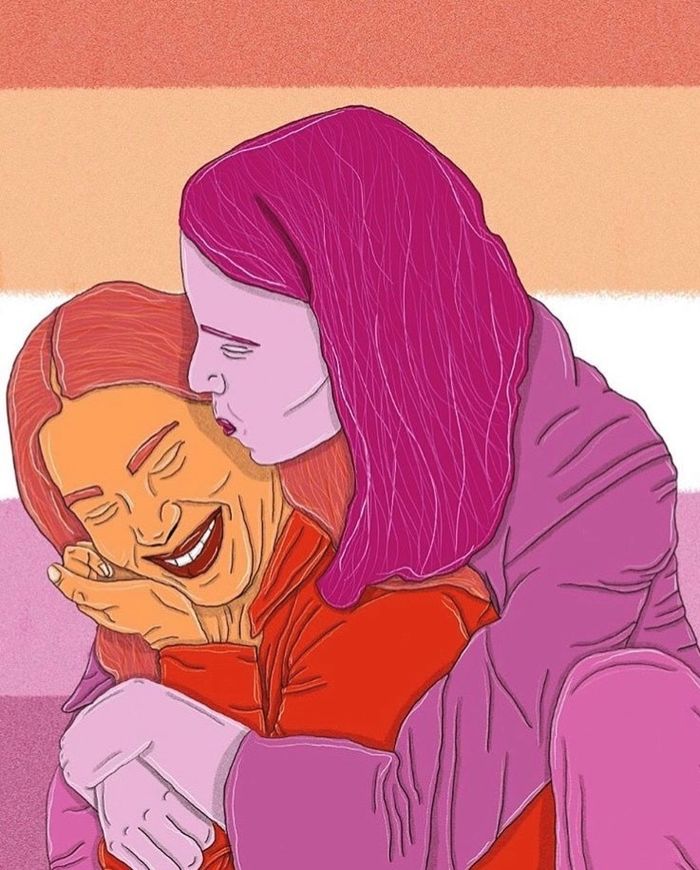How to get an A* in Therapy
Lola Miller reflects on her journey with therapy and shares her tips on how to get the best out of it.

Content Note: This article contains a detailed discussion of mental health, therapy and briefly mentions lockdown, depression, grief, assault and childhood trauma.
I started seeing my therapist in the final year of sixth form, when stress combined with a nice little cocktail of neurosis overwhelmed me. In the first session I furtively glanced at the stress ball in the sand tray — yes, seriously — and eventually blurted out: ‘If I pick that up are you going to psychoanalyse me?' She laughed at me.
I go back to see Ellie* every holiday. At the end of an undoubtedly stressful term at Cambridge, I head towards the therapy rooms, get there two minutes late (always), sit with a terrible cup of instant coffee and whinge. Coming back to my hometown for lockdown as a finalist, I felt myself a seasoned veteran when it comes to therapy.
Recently, several friends have said: ‘Maybe I need to get some therapy.' If you’re asking the question ‘Do I need therapy?’ you would probably (absolutely) benefit from it. Maybe it’s that lockdown has made everyone reflect upon past trauma, or maybe it’s exacerbated pre-existing problems, or perhaps we are all — very understandably — feeling isolated. As someone with depressive tendencies and rather poor self-control, I've struggled to get out of bed some days in this strange corona world; it seems there isn’t all that much to get up for.
"Knowing when you need therapy is quickly followed by knowing that you deserve it. I often hear people arguing: ‘But other people have it worse.'"
The road to an A* in therapy begins with knowing when you need it. My friends will surely attest — but please don’t ask them for details, I like my image as mildly sane — that I can sometimes be busy and cheerful, and if I’m down, I’m crying in that vaguely-normal-stressed-Uni-student way. They would also attest that sometimes I cry over the calories in a teaspoon of oil. And I've learned that it's important to distinguish between the two; one means I'm processing difficult things pretty well, and the other means I'm on a one way trip to Crazy Town and I need to yank on the emergency brake.
Knowing when you need therapy is quickly followed by knowing that you deserve it. I often hear people arguing: ‘But other people have it worse.' The simple response to that is this: those people who have it worse can also decide to get some therapy. If you had a minor ear piercing infection, you wouldn’t decide not to take antibiotics on the grounds that someone with a flesh eating bacterial disease might need them more.
Seeking therapy is never invalid. I've had friends go to process grief, assault, low self-esteem, mental health issues, family troubles, relationships ending, stress, and childhood trauma, among others. And that’s not to be preachy — therapy might not work for everyone, but in my experience, it’s about the therapist, not the therapy itself. This is my next tip: know when you’ve landed a bad therapist.
"Sometimes deciding that someone needs to hear your voice is the least selfish and most important course of action you can take, for yourself and for the people around you."
My first ever counsellor was… not my kind of person. We mostly sat in silence, as her method was to wait for me to bare my soul without provocation. She definitely would have judged me for picking up that stress ball. After that 12-week horror, I decided I was done with therapy. I was wrong. To get that top grade, you’ve got to know when to call it quits, to find someone that suits you better.

Next up is knowing how to shake therapy off. Since lockdown, my therapy sessions have been in my bedroom on Skype. This isn't ideal. But I know to line other things up afterwards. My call ends, I have a coffee in the garden, call a friend, or read a book. Therapy isn’t supposed to make you miserable but it's good to know how to close that Pandora’s Box after an intense session.
During lockdown I’ve had many differing sessions with Ellie. Sometimes, her call comes through and I think ‘Really? Another week has gone by? I have nothing to say, I’m pretty fine.' Sometimes I think ‘Thank god, I've got so much to rant about.' If I’m feeling particularly hyper-performative, I’ll write down a list of things I want to talk about. On these days, Ellie might praise my self-knowledge or introspection. When that happens, a little smirk slides across my face.
'So', I say, 'Do I get an A* in therapy?' Ellie looks at me for a long time over Skype.
'No!' She takes a breath. 'You don't need to perform well in therapy. That's not a thing. There are no grades. Are you really feeling competitive about therapy right now?'
Which brings me to my final tip, one that I'm still learning myself. You don't need to be good at therapy. There's probably no such thing as being good at therapy. The only thing you can do is acknowledge that you might benefit from a little help, that you deserve it, that you deserve someone that suits you, and that deciding to go to a therapist doesn’t need to be a life-altering or dramatic event. Sometimes deciding that someone needs to hear your voice is the least selfish and most important course of action you can take — for yourself and for the people around you.
 Features / Beyond the porters’ lodge: is life better outside college?24 February 2026
Features / Beyond the porters’ lodge: is life better outside college?24 February 2026 Theatre / Footlights Spring Revue? Don’t Mind if I Do!25 February 2026
Theatre / Footlights Spring Revue? Don’t Mind if I Do!25 February 2026 News / Cambridge academics sign open letter criticising research funding changes22 February 2026
News / Cambridge academics sign open letter criticising research funding changes22 February 2026 News / Student and union protesters hold ‘Trans Liberation Solidarity Rally’ 24 February 2026
News / Student and union protesters hold ‘Trans Liberation Solidarity Rally’ 24 February 2026 Fashion / The evolution of the academic gown24 February 2026
Fashion / The evolution of the academic gown24 February 2026










